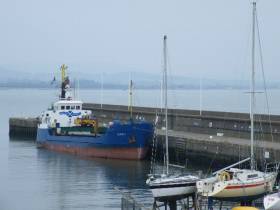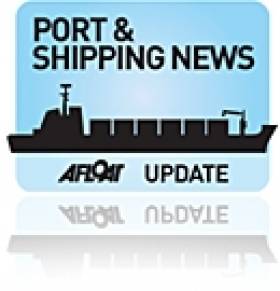Displaying items by tag: Detained cargoship
Detained Dutch Flagged Cargoship Tied Up In Wicklow Port
#Detained - A Dutch flagged general cargoship that was due to Dublin Port last night remains under detention in Wicklow Port having discharged packaged timber, writes Jehan Ashmore.
Irish maritime authorities detained the 2010 built Crown Mary on behalf of the Paris MoU in which Ireland is a member of the organisation. The mission of the Paris MoU is to eliminate the operation of sub-standard ships through a harmonized system of Port State Control. A list of ships that are currently under detention in the Paris MoU region can be consulted here.
The 2,622 gross tonnage Crown Mary had sailed from New Holland, located on the Humber Estuary opposite Hull, a major North Sea ferryport. Just over a year ago Afloat previously reported of another detained cargoship Burhou I in Wicklow. Again this albeit smaller cargoship was employed in the timber trade.
The Paris MoU (Memorandum of Understanding) on Port State Control (PSC) was signed in January 1982 by fourteen European countries at a Ministerial Conference held in Paris, France. It entered into operation on 1 July 1982. The principles of the MoU also cover the following:
Safety of life at sea
Prevention of pollution by ships, and
Living and working conditions on board ships
The Paris MoU on PSC is an administrative agreement between 27 Maritime Authorities. The participating maritime Administrations of the Paris MoU covers the waters of the European coastal States and the North Atlantic basin from North America to Europe.
Since the detention was imposed last Saturday, Afloat had noted the 88m Crown Mary shift berths within Wicklow Port. This involved the vessel vacate the main commercial Packet Quay to the East Pier so to enable other cargoships to dock. So far two ships have called, Thea Marieke also Dutch flagged arrived from Sheerness, Kent. Last night the vessel docked in Dublin and this morning Scot Pioneer called to Wicklow having sailed overnight from Warrenpoint.
Only the day before the detention, Wicklow recieved the first call of the newly renamed car ferry Fraser Aisling Gabrielle. The 44-car capacity ferry made an overnight stop while en route from Waterford to Greenore from where next month a new Carlingford Lough service is to operate to Greencastle.
Update May 24 2017: Detention of Dutch Flagged Cargoship In Wicklow Port Is Lifted
Detained Scottish Timber Trading Cargoship Finally Departs Port
#Detained- A cargoship from Scotland that was detained in Wicklow Port for a more than a week including St. Patrick's Day, finally departed last night bound for Belfast, writes Jehan Ashmore.
The 674 tonnes Burhou I was detained by Port State Control at Wicklow Port, having discharged a cargo of round timber from Kyle of Lochalsh in western Scotland. This is a regular trade to the port as featured previously on Afloat.
Burhou I is a Belize flagged small coaster which was detained following an inspection by authorities. The detention surrounded a single technical deficiency to resolve, before the ship departed yesterday in the early evening.
The detention of the 58m long Burhou I involved having to shift berths within Wicklow Harbour. This led to the cargoship berthing alongside the non-commercial East Pier.
It is from this vantage point where spectators gather to watch the Round Ireland Yacht Race hosted by the nearby Wicklow Sailing Club located at the foot of the pier.
The veteran cargsoship built by a German yard in 1978 is a sister of Isis (see, visit to Ramsey, Isle of Man). Both coasters have self-loading and discharging capabilities to transport a variety of cargoes among them timber felled in Scotland.
These coasters regularly trade throughout the Irish Sea and also to ports in south-west England. In addition they provide a domestic freight service to the smaller harbours in the Scottish Outer Isles.
Also in the port during the week was the 82m long Nestor. This was only the second call to the port of the 2,452 tonnes cargoship that loaded scrap metal in recent days and departed for Liverpool.
Judge Concerned for Crew of Cargoship Detained in Dublin
#DetainedBulker- A High Court judge has expressed concern for the crew of a Belize registered 19,000 tonnes cargo ship detained in Dublin Port since last March and who have not been paid since late last year.
The 17 crew, represented by the International Transport Workers Federation, had brought proceedings against the owner of the MV Clipper Faith for unpaid wages of approximately $320,000.
The ship's owner, the Liberian-registered Afternoon Maritime, said it lacked funds to pay the crew, who are largely from Russia and Ukraine. For more on this story, The Irish Times has a report.






























































